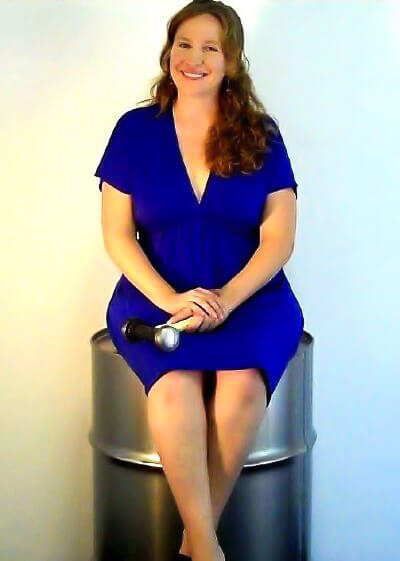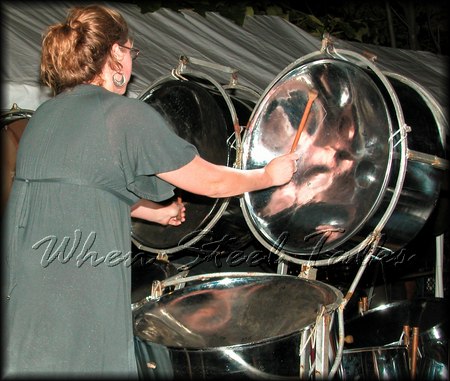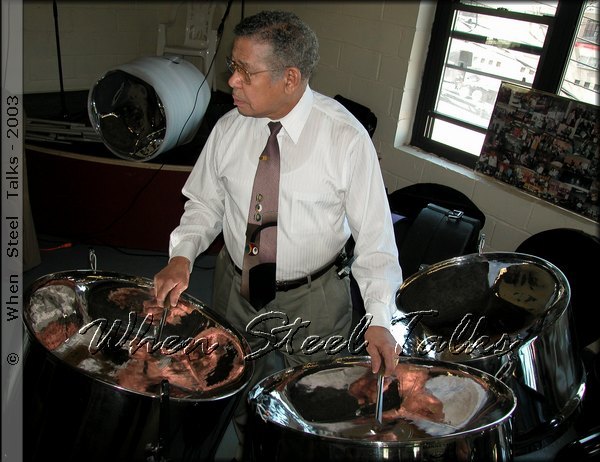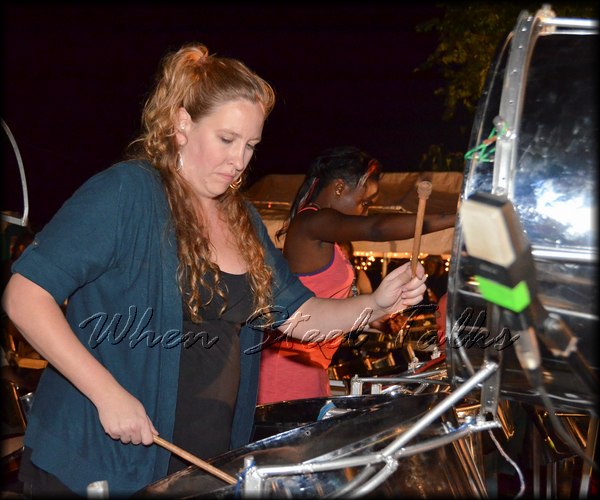WST - “You are a steel pan musician, composer, tuner, builder, and owner of Barracuda Steel Drums. Tell us about yourself, and when you knew that the steel band business is what you wanted as a career path - and don’t leave anything out, LOL.”
Emily L. - “I’ve been playing pan since 1994, where it was part of the music program at my university, Ithaca College. In the US, the steelpan is considered a member of the percussion family, and I was studying to be a professional percussionist. Steelband was one of the required ensembles in the performance program, and I loved it from the start. My teachers were very supportive of me, and it was during this time, as a student, that I met Ellie Mannette. I started spending summers at his steelband workshop, and met many great performers and composers like Ray Holman, Robbie Greenidge, Andy and Jeff Narell. I found that steelband had a kind of joy in it that I couldn’t find in classical music. So, after I graduated with my performance degree, instead of pursuing a career as a classical percussionist, I moved to West Virginia to study steelpan manufacturing with Ellie, full time. I spent over six years with him, learning his methods of building and tuning steelpans. In 2004, I moved to Austin, Texas and established myself as an independent manufacturer. I named my company “Barracuda Steel Drums” after one of Ellie’s historic instruments - without his guidance and support, I wouldn’t be where I am today.”
WST - “How is business going?”
Emily L. - “Business is good, thanks for asking! Steelpans are in high demand worldwide, and there are very few manufacturers - even fewer that build pans really well. There aren’t enough well-trained builders or tuners to meet the demand, primarily because the training takes such a long time, and that lifestyle can be stressful. It takes years of commitment to reach a level of excellence in this artform, and a lot of sacrifice. I really respect the craftsmen who, for decades, have made this their life’s work.”
WST - “You are in a position of power in the steelpan fraternity - and you are a Woman - talk about what this life journey has been like so far?”
Emily L. - “Well, technically, “fraternity” implies all men, right? So I’ll talk about my experience in the community. For the most part, my journey as a pan woman has been very positive. I travel all over the US, and around the world, doing what I love, meeting interesting people.
“As a pan player, it seems very normal to see women performing in every section of the band - with the exception of rhythm, where, worldwide, I still see very few female representatives. “It’s great to see more women composing and arranging and drilling, but – especially for Panorama – this is still pretty rare.

Emily Lemmerman
“Being a female tuner unquestionably surprises people. Some people just don’t believe it until they see me do it. So I just do my job, and let my work speak for itself. It’s not always a bad thing to be underestimated – it’s easier to exceed expectations!
“When I was tuning for Skiffle [Steel Orchestra] this year, skeptics would approach me, quiz me, and challenge me. One person came up and said “I heard there was a girl tuning here! So, I came by and was spying on you for the last half-hour… you really know what you’re doing!” The compliment was nice, but he was surprised that I was doing a good job. I replied, “I know I’m new to you, but I’m not new to this.” I’ve been working professionally for more than fifteen years, so it’s no fluke – I’ve worked very hard to hone my skills.
“In schools across the US, tuning is not a public performance. Tuning in front of a crowd in Trinidad definitely took some getting used to, and as a foreign, female tuner, I definitely get some extra attention. Knowing that skeptics are watching very closely inspires me to do the best job I can.
“I’m glad that I’ve spent so much time getting to know the culture, making friends with people, being a member of the community. I felt really ready to hold my hammer high this year in the birthplace of Pan.
“The last year was a great one for me in the US as well – the Percussive Arts Society International Convention featured Andy Narell on a headline concert in November 2012. Andy presented his “University of Calypso” program with Lord Relator, and they performed with over fifty panists combined with steelbands from the University of North Texas and McCallum High School. These are both exceptional steelband programs that I’ve been tuning for many years, and it felt great to hear those pans on stage together in concert with Andy at PASIC.”
WST - “Further to the above-question, what is it like to be a female steel pan manufacturer and tuner? How is the interaction with your male counterparts in this field?”
Emily L. - “In a perfect world, I would be defined exclusively by the quality of my work- whether I was a strong tuner, teacher, player, arranger, or songwriter, independent of my gender. In reality, it’s an inescapable fact that it is still rare to be a woman doing this job. Globally, it’s a rare thing altogether – there just aren’t very many professional tuners in the world.
“Whenever a woman works in a nontraditional field, she is watched with great scrutiny. I’ve playing drums since age 9, so I’m long accustomed to performing as a minority. Some might feel intimidated by this, but it inspires me to hold myself to high standards – I definitely work like I have something to prove.
“Sometimes, just because of my gender, I am overlooked by skeptics, and that does feel sexist. If I am standing next to another tuner, even holding a hammer, the assumption is that I am his assistant. This has happened many times, in many countries, and I expect will continue through my career.

Emily Lemmerman
“So, I have to invest extra effort to define myself as an individual and professional – I always have to be conscious of how I present myself. Overall, I find that my colleagues are much more open-minded than the general public – I’ve dealt with more skeptics on the management side than from other tuners. I’m not professionally aggressive by nature, so it is sometimes a challenge for me to insist on the same treatment and consideration bestowed on my colleagues. So I have to remember: while I’m not new to this, I’m new to them.
“In Trinidad, I’ve been treated very well - other tuners, like Mappo and “Birch” Kelman have been supportive and encouraging, and Gill’s Pan Shop has welcomed me and my work for many years. There are only a few tuners in the world that I’ve met that I don’t get on with, or have been dismissive or rough to me, and I’m really glad that they are in the minority. It’s important to me to have a good relationship with my colleagues.”
WST - “Do you know if there is a general interest from other female players, to become more hands-on in the manufacture and tuning aspect in steel pan?”
Emily L. - “I meet people all over the world that are interested in building and tuning pan- men and women, but there are very few that have the time, dedication, or faith to study for as long as it takes to truly become excellent. I know of other women who have studied tuning, but I don’t know any other individual professionals.”
WST - “You learnt your craft under the tutelage of Dr. Ellie Mannette; talk about this?”
Emily L. - “For more than six years, I was one of Ellie Mannette’s full-time students. This was an incredible period in my life, and I learned much more from him than just manufacturing and tuning. I learned about the history of Pan and the culture of Trinidad. I was part of Ellie’s student group that toured Trinidad in 2000. I met Ambassadors, a President, a Prime Minister, in addition to royalty in the Pan world – players, teachers, composers, arrangers, innovators. And I learned to hold myself, as a craftsman, to the highest possible standards.
“Ellie is a visionary in many ways. Not only did he see beautiful potential in these trash cans so many years ago, he achieved it, cultivated it, and continues to exceed his best work with each new instrument. His individual achievements are remarkable on their own, but his work as an educator might surpass them all.

Dr. Ellie Mannette
“Years ago, Ellie realized that it would hurt the art form’s future if he kept his techniques to himself, and he decided to share his skills with many apprentices, even though other tuners guard their information out of fear of thievery or exploitation. Passing along his knowledge to another generation is quite possibly the most important aspect of Ellie’s legacy. To this day, I know of no other comprehensive system of pedagogy that equals his, either in quality or scope.
“Those of us that studied with Ellie worked in a climate that encouraged collaboration. We recognize the global reach of this art form, and understand that we all aspire to elevate it toward its best and highest potential. We were taught to build beautiful new pans, and to blend all pans to Ellie’s high standards – no matter where they originated. And I am glad to continue that tradition in Trinidad, both as a tuner, and as a performer.
“The first Panorama I ever played – Semis with Invaders – I stood on that grandstand, looking out at the thousands of people that are touched by this art form, and was moved to tears. To play with that band, on that island, I felt a circle complete. Ellie had birthed this beautiful art form, moved thousands of miles away, touched my life profoundly, and now my feet were on Trini soil, jumping up on that stage. It was a holy experience.
”Now, after every Panorama, after I push off to the other side of the grandstand, my tradition is to call Ellie, first thing. He is like a proud father, and is always flattered that anyone can love this thing that came from such a humble beginning. I am so grateful to continue my close relationship with Ellie- he is truly like part of my family.”
WST - “You have tuned instruments for London, and Trinidad Panorama competitions. Share some overall details, how it came about, and what it was like as a foreigner, and as the first woman Panorama tuner?”
Emily L. - “I have tuned for London and Trinidad Panoramas so far- I hope to eventually tune for NYC and Toronto, as well as other Caribbean Panoramas. I’m extremely proud to be the first female Panorama tuner on two continents. It’s very important to me to be a good role model for other young women.
“2013 will be my third year blending for Paul Dowie’s CSO in London- so far, I’ve blended the frontline, with Mark Wilson blending the background pans. Paul’s was the first Panorama band to take a chance on a foreign female tuner- and I’m so thankful for that.
“This year, 2013, was a landmark for me, tuning for the large band category in Trinidad for Skiffle. It’s been a goal of mine, ever since I picked up a hammer, to be the first female Panorama tuner in Trinidad, and Skiffle gave me that opportunity. Ray Holman’s “Sapna (The Dream)” was such a beautiful tune and arrangement- I was honored to help his notes sound even sweeter.
“Skiffle reached out to me before Semis, through Ray. He’s known me for many years, and vouched for me – I’m not sure if a foreigner has ever tuned for the large band category. Altogether, I tuned close to 70 pans for Skiffle, in all sections. I was honored to work alongside a pair of tuners I admire very much - “Birch” Kelman and Guppy Brown.
“I loved working with Skiffle- they treated me professionally, and made me very comfortable. They indulged me with plenty of time to work - I was trained to blend very thoroughly. I wanted to take my time and make sure each note was as sweet as it could be.
“During the time I worked in their yard, several school groups came through, and I spoke to some of these very young children about tuning. It made me so happy to think that, for these kids, it’s possible that I’m the first tuner they ever saw. To them, it will never be strange to see a woman doing this work, and hopefully it will be a lesson to them that: girls can do anything they put their mind to.”
WST - “Give some insight about what goes into some of your clinics and workshops you deliver around the country?”
Emily L. - “Trinidadians might be surprised to know how many steelbands are in schools and universities here in the US. I fly all over the country tuning pans, and sometimes in addition to tuning, I will stay for rehearsals and drill the band, or give a presentation on Panorama, steelband history, or talk about manufacturing.
“I also work at festivals and summer programs, sometimes teaching songs I’ve written and arranged. Here in Austin, I’m a co-founder of the Inside Out Steelband Camp for kids, and we teach them music from a score, by rote, classical music, music theory, rhythm, history of Pan, and about Trinidadian calypso and soca.
“The steelpan is truly an ambassador for the country of Trinidad and Tobago, and has touched a countless number of lives. Because of steelband, people all over the world know about Trinidad.”
WST - “You are usually seen playing the quadrophonic pan in the steel orchestra - a voice of the instrument which is viewed as intimidating by some. What draws you to play this pan in particular?”
Emily L. - “When I join up with a Panorama band, I offer to play whatever instrument the band needs. The first Trinidad band I played with was in 2009 with Invaders - founded by Ellie Mannette, and the oldest existing steelband in the world. They asked me to play four-cello, which I’d never played before, but had fun learning. That year, Invaders didn’t get through to Finals, so I joined up with Silver Stars on quadros for “First in de Line.” Even though I play quads here in Austin, the layout is twisted, so that was also a challenge!
“It was great fun learning two Panorama tunes in one season on unfamiliar pans. Now, I prefer to play instruments that I don’t often see over the rest of the year here in the US. So, in addition to four-cello with Invaders, I’ve performed on (twisted!) quadros with Silver Stars, CSO in London, and CrossFire in NYC. I’ve played nine-bass with Power Stars, and (twisted!) double seconds with Skiffle.

Emily Lemmerman on quads with CrossFire in New York
To crackshots, this all might sound simple. I don’t consider myself an especially strong player - it’s just an enjoyable challenge for me! And I must admit- I am definitely drawn to a challenge. I’m a much stronger musician if I’m playing a pan I know with a score in front of me, but I think it’s equally important to be well-rounded. It’s difficult to learn to puzzle out a new pattern, and to memorize music quickly – so I seize every opportunity to exercise those skills.”
WST - “You have played pan in Trinidad, New York, and other locales - talk about and compare your thoughts on differences and similarities?”
Emily L. - “I’ve played pan in universities across the US, Panoramas in London, New York, and in different yards in Trinidad. I’ve performed reading sheet music, reading chords off of “lead sheets,” and sometimes learning by memory alone.
“Every band, every yard, every bandleader is different. I try to pay close attention to these differences- I find them very interesting, and I try to find something useful from each experience to share and elevate other bands I work with.
“In Universities in the US, directors tend to spend much more time talking, rely on scores more often than not, and practice always has a defined start- and end-time. Rehearsals are very controlled, centralized, and you are expected to know your notes before rehearsal begins. Americans in Trinidad often feel like Panorama rehearsals are confused and chaotic, but they are just not accustomed to how notes are passed around. What sounds like chaos is often effective rehearsal – it’s the sound of 100 panists learning new notes at the same time.
“I’ve been to lots of different yards, and experienced many Panorama rehearsal techniques. Some bands are definitely more organized than others, some have very different ideas on time management, but I’ve learned a lot from every yard I’ve been to. I’ve especially learned a lot about drilling, and I incorporate Trinidadian methodology into my own approach.”
WST - “What advice would you give to young women who wish to become steelpan musicians? And to those who wish to become tuners and/or pan builders?”
Emily L. - “My advice to young women is: you can do anything you decide to, but it doesn’t hurt to work twice as hard as a man. If you want to be a pan builder or tuner, just know: it is not about the strength of your arms or back. If you have a strong will and a good head on your shoulders, you can do this. Flipping a bass pan is not that hard.”
WST “If you could change one thing about Pan - what would that be?”
Emily L. - “Especially in the Panorama world, there’s too much of pettiness. I’ve played in bands that discourage its members from visiting other yards, and I think that’s a shame. There’s so much to learn from each other, and while Panorama is competitive, at the end of the day, we’re all playing music! I personally don’t feel fanatical about one band or the other- I have room in my heart to love all bands. It’s such a beautiful thing that we do; I just want to be supportive of all.
“My favorite thing about steelband is that it inspires joy in people. It is so accessible, and can be so inclusive, that it disappoints me when people act petty or separatist. There can only be one Panorama champion per year, and judging music is unavoidably a subjective thing… I can’t get worked up about the results. I’m always so proud of Pan itself – the fact that it is important to so many people – that I’m just happy to be in the middle of all that music.”
WST - “What is Panorama to you?”
Emily L. - “I love Panorama. It is like the Olympics for steelband, and I don’t know of anything like it in any other style of music. It’s a high-stakes musical contest that inspires athleticism, technical prowess, virtuosity and creativity, and as such, engages talented performers, showcases the national instrument, and captures international attention.
“I love that I’m annually involved in several Panoramas, and, while it’s not personally my favorite kind of music to listen to (don’t tell!), I enthusiastically support it as an institution. There’s a huge amount of talent involved in these productions!
“I was recently talking to Edwin Pouchet – a great composer, arranger, and another person that has been a good friend to me. We met on ‘the drag’ this year, and he asked about my experiences playing with different bands. I know people in several bands, and I truly wish them all the best, but I don’t feel fanatical about anyone. I told him that to me, I’m happy to see bands get through Semis to Finals, because I know how much hard work is invested, and it’s a shame when they don’t get to perform twice on that grandstand. At Finals, I’m just so thrilled to be surrounded by such passionate music that I don’t have time to get stressed about the results. I understand the championship title is an important thing, and an important thing to strive for, and I am happy for the band that clinches it each year.
“In the US, our closest parallel to Panorama is DCI, Drum Corps International, and we have amateur iterations of these contests in high school marching bands. I feel similarly here, and have tried to instill this perspective into students: yes, we are being judged, and that feedback is constructive, but this is not a sport where there is always a clear winner. Judging music is a subjective effort - there is no scoreboard, there are no goals. The best judges are ourselves: we know how far we’ve come, we know whether we did our best. The stakes here are way different than Panorama, but all these musicians should take great pride in their achievements.”
WST “Are there any other steelband related matters you would like to bring forward?”
Emily L. - “I’d specialized in steelpan in US school systems for over a decade before I ventured into the Panorama world. Crossing over was initially stressful and intimidating, because it was so different than what I was accustomed to. Now, I live with one foot in the US school and university system, and one foot in the panyards.
“I love being a part of both worlds, and I hope to see more musicians crossing over as well- in both directions! In my travels, I do my best to advocate, facilitate, and educate American programs about what’s happening in Trinidad, and I want to encourage more Trini influence in American programs.
“We are different parts of the whole steelband community, and we have plenty to offer each other. I’d like to see these parts come together more often, as a whole, with more dialogue and exchange.”
Their Story, Their Voice, Their Life, Their Dreams - click for more stories
Leave a comment in the WST forum







